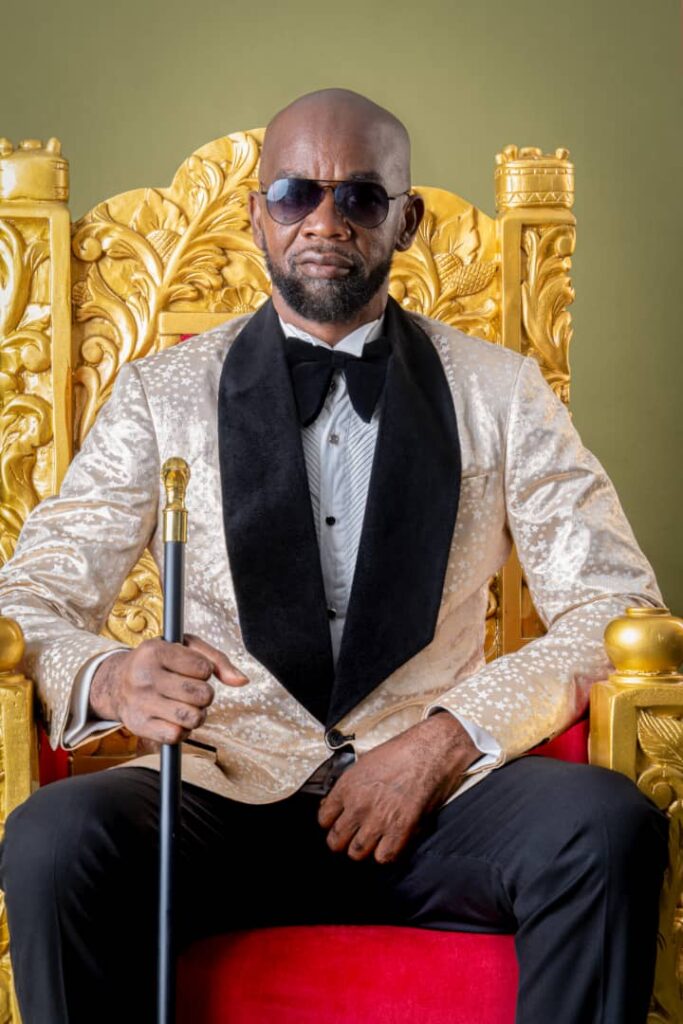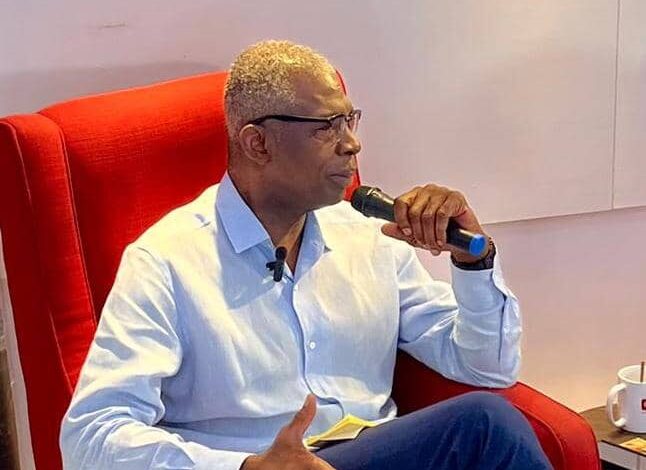Kingsley Ogoro: The creative hermit @60

By Zik Zulu Okafor
THERE are times that too many talents given by God to one person could be both a blessing and a burden. If you are in doubt, then look for my friend and brother, Segun Arinze. Segun is an ex-president of the Actors Guild of Nigeria (AGN). That means he is an actor. But he doesn’t act only on screen. He acts on stage, too. That’s theatre. He is currently the president of the Association of Voice-Over Artistes of Nigeria (AVOA). But Segun is also a singer, choreographer and dancer, television presenter, movie director, documentarist, and copywriter. So, when you are looking for Mr. Segun Arinze, you’d have a daunting task which office or destination to locate him. But there is one place, only one place that you are certain to find him with one or two visits. It is the office of the subject matter of today’s lecture, Mr. Kingsley Ogoro, the one we all fondly call Sir K. They have been friends for about 37 years.
So, I asked him to capture for me the core essence of this man who has been his co-worker, partner, professional colleague, and great friend in the last 37 years. Hear him:
He is a bohemian. Take that from me. But he’s fiercely focused. You don’t hear him talk much. He just strives to get results, and he likes his space. And don’t make the mistake of asking him not to try anything because that’s when he will dare that particular thing. And he will achieve his purpose. He is a man of courage and conviction. Above all, he is a tech geek. He has an intense passion for technology and a deep interest in learning and experimenting with it. Sir K is excited by innovation, and during the nascent stages of Nollywood, he was always the first to explore new devices, cameras, sound systems, software, apps, and all that. Amazing guy he is.
But I also have another good friend here. His name is Uzodinma Okpechi, Fellow, Directors Guild of Nigeria (simply known as Uzo). If you have ever stumbled on the WhatsApp platform called Filmic, founded by Mr. Charles Novia, a screen writer, director and producer, you’d see that there’s only one word associated with Uzo, his creed, and it is MADNESS!
Uzo was rebellious from birth. His mum, an educator, thought her son was an exceptionally student, and so she sent him to a university to study medicine. But a bohemian Uzo would later take a walk from his medical school to seek his destiny in an unstructured, unregulated, complex, and complicated industry called Nollywood. His destinations were Klink Studios and Kingsley Ogoro Productions in Surulere, Lagos, both owned by Mr. Ogoro. Okpechi worked with Sir K for three good years. Today, he is an eminent director in Nollywood. So, I asked him to describe the Sir K he knew. His words:
Sir Kay is a dangerous resource. He was amongst the first in our creative space to realise that strength is in authenticity, not in dominance. Fearless and resolute, Sir K would be remembered for raising a battalion of bohemian filmmakers and technicians in Nollywood, and that includes yours truly. He doesn’t talk much. You see his action. You feel it. He is a dangerous creative resource.
Justice Atogogo is here. He’s also of Nollywood and more. Someone once asked me to qualify this young, nonconformist with one word, and I replied: INSANE. Insanity, yes. If you have any doubt, then watch some of his disruptive productions and these include Lahira, 10th Avenue, Madam Fix It, and Onile: The Blood Line. Then, you’d see his creative mindset. Simply crazy. Justice Atigogo’s voice is loud if not strident. He knows everyone in Nollywood and talks about each person with equal passion. When he is around, he colonizes the gathering. Of Sir K, he said:
Big bros? Oh, he’s not normal. How can people be going from left to right to get results, and he alone would go from right to left and then get even a better result? Is that a normal person? But what baffles me most is that when this bros begins to make it big in one venture, and you then start to think he would stay there and maximise his advantages and make all the money, the man go just waka. E don move to other things. Name it, from dance and choreography jingles, then music, studios, equipment, movie production, advertising, shooting commercials, all. He is permanently on the move. That man? Forget him. We haven’t told his (story) yet.
That’s the voice of the maverick, dissenter, and free thinker, Justice Atigogo.
My perception: But what about this lecturer tonight. What are his thoughts about Sir K? Kingsley and I shared the same neighborhood in the upscale part of Surulere called Adeniran Ogunsanya Street for over 15 years. In those long years, I didn’t see him by chance on the street, not in his car driving out or coming in; not in a shopping mall, grocery store, in a lounge or in any of our small hotels in Surulere. You can’t see him. Kingsley Ogoro is invisible! Because he is cocooned in his office or studio dealing with inanimate objects, and catching up with trends in technology. He is a visionary, an impassioned dreamer, and an ultra-committed change-maker.
Simply put, he is a hermit, a creative hermit. He is a rare spirit who has chosen the silence of solitude over the noise of fame. Sir K does not seek the limelight, yet his artistry illuminates every frame he touches. His absence from the public eye only deepens the mystery, while his work stands as an undeniable testimony that a genius does not need to shout. He simply creates, and the world listens and watches. This is Sir K!

Kingsley Eloho Ogoro (Sir K)
Let’s take our motion picture industry, for instance. The creative revolution and ascendancy of the industry that would come to be known as Nollywood was triggered in 1992 when Nek Video Links released the movie, Living in Bondage, produced by a young, reticent but resourceful filmmaker, Okey Ogunjiofor. Many young creatives, film, television, and theatre graduates and broadcasters took a plunge into the nascent home video industry after the astounding commercial success and popularity of Living in Bondage.
Almost everyone at this time wanted the spotlight – to be an actor basking in applause, a producer commanding sets, or a director orchestrating stories and calling shots. But not Sir K. His gaze was never on the stage. It was fixed on the engines behind the curtain, the hidden levers that powered the illusion. He was a razor-sharp thinker, a visionary trailblazer who understood that for cinema to breathe, it needed lungs of steel — technology, production infrastructure, post-production finesse, and technical mastery. Sir K chose this silent path.
His appetite was not for the fleeting glamour of red carpets but for the enduring originality of craft. While others chased fame, he chased machines, lenses, edit bays, and signal paths. He became the guardian of the unseen, the force that gave Nollywood its technical backbone.
It was Sir K who became the very face of production equipment, dictating the transition from one cinematic epoch to another. Under his watch, Super VHS gave way to BetaCam, and BetaCam bowed to the digital revolution. He was the conductor of technological shifts, ensuring the industry marched in step with the world.
His office was not an office; it was a laboratory, a film school without walls, a rendezvous of restless young dreamers who found in him both a mentor and a compass. Cameramen, editors, gaffers, sound engineers. They streamed into his space, eager to learn under the man who understood that the future of African storytelling was not just in the script, but also in the camera’s gaze, the cut of an edit, the glow of a light and the hum of a microphone. And so quietly, but decisively, Sir K became the architect of cinematic possibility, the silent auteur who never called “Action!” on set, yet ensured that when it was called, the world could see and hear Africa’s magic with clarity, precision, and power.
The alumni and alumnae of Kingsley Ogoro Productions and Klink Studios’ school are uncountable, working in Nigeria and different parts of the world, hoisting aloft the Kingsley Ogoro Production vision and uncompromising commitment to professionalism. They include the quiet but accomplished director, Simisola Opeoluwa, the avant-garde director, Uzodinma Okpechi, Abiola Oke, Michael Agesse, Michael Anakpa, Bola Hussein, Solomon Nwoko, Ngozi Nkebakwu, Wale Adewuyi, Albert Kalu, Gabriel Opaniyi, Roli Okunowo, Monique Amaichigh, Patricia Opeoluwa (nee Agesse), Yomi Omidiran, Ronke Orija, Happy Novia (nee Agesse, Charles Novia’s wife), Lucky Eromosele, Mellanby Ileogben, Cyril Ogoro, Clifford Ogoro, Frank Amedigni, Kayode Aina, Uzezi Apata, John Osemeka, Ohis Izebe, Ahamefule Umeh, Kehinde Fregene and Muyiwa Okeowo, among others.
Sir Kay remained the immovable fulcrum of Nollywood’s technical evolution, the silent craftsman who redefined the grammar of filmmaking and relentlessly lifted the bar of production excellence. Yet, even in his mastery, he never lost sight of the pulse of African storytelling, its texture, its rhythm, its authenticity, and the urgent need to project its essence beyond Nigeria’s borders, beyond Africa, into the consciousness of the world. Thus, when he stepped with quiet audacity into the realm of movie production, he altered the narrative landscape forever. His works, The Return, The Widow, Across the Niger, The Battle of Love, Dangerous Babe, and Veno stand as testaments of vision and portraits of cinematic excellence.
But in 2003, Sir Kay shook the continent and stunned the world with a comedic hurricane—Osuofia in London. A rib-cracking, laughter-soaked phenomenon, it became more than a film. It was a cultural explosion that shattered every box-office record and placed him in a league of rare cinematic geniuses. With it, he announced himself as the uncontested maestro of African storytelling, lifting its histrionics to dazzling heights.
Despite his attainments, however, it must be stated that Kinsley’s parents, Mr. and Mrs. Ogoro did not imagine, not to mention support, the “crazy idea” of their son going into entertainment. In fact, they were shocked to hear of their little boy dancing his way to the finals of the John Player Dance Championship, a national disco dancing competition in the 1980s, making him a star to watch out for. Determined to secure what they considered a respectable job in the future, they quietly packaged him and sent him off, far away to the University of Sokoto to study Banking and Finance. They wanted to have a future bank chief executive in their family. So, Kingsley studied. He acquired the degree. And returned home to present his certificate to his parents. But just that was the end of the script.
Despite the stern disapproval of Kingsley’s parents, who could not comprehend his daring plunge into the uncertain world of entertainment, there was one voice, clear and unwavering, that saw beyond doubt into the promise of his destiny. It was the voice of a woman, his eldest sister, Chief (Senator) Stella Omu. With eyes sharpened by faith, she saw the rare flame of talent burning within her little brother and stood firmly by his side. With undoubted confidence, she placed her trust and invested her resources into the fragile beginnings of what would later blossom into the formidable creative edifice called Klink Studios, a powerhouse that would go on to produce some of Nigeria’s brightest music stars, including Segun Arinze.
King Sunny Ade’s Authority: Klink Studios, however, announced its arrival on the national stage with unmistakable authority when it undertook the production of King Sunny Ade’s landmark album, Authority, released on March 23, 1990. In that single stroke, the young company not only showcased its promise but also etched its name into the annals of Nigeria’s music history. Soon after, Sir K founded Kingsley Ogoro Productions and, in doing so, altered the trajectory of technical production in Nollywood forever. It was a befitting climax to a journey that began in 1988 at a production company called Digi-Track, formerly known as Ajaka Films, located at Tafawa Balewa Square, Lagos. It was indeed here that his path and Segun Arinze’s would intersect, and a historic collaboration and friendship would be forged.
Today, Kingsley Ogoro, the man we revere as Sir K, stands tall, not as the banker his parents once envisioned, but as a towering icon of Nollywood, a restless innovator, a creative ninja, a mentor of mentors, a pathfinder and creative hermit whose genius has left an indelible imprint on film, music, and entertainment.
At 60, he embodies a life of daring, of vision, and of triumph over doubt. His strides have not only shaped the story of Nollywood but have also inspired a new generation to dream beyond the ordinary.
And so, we rise to salute him. We lift our voices in gratitude for his gifts. And with joy in our hearts, we say: Happy Birthday, Sir K! Congratulations!!!
* Okafor delivered this paper on the occasion of the 60th birthday celebration of Kingsley Eloho Ogoro (Sir K) on August 30, 2025




